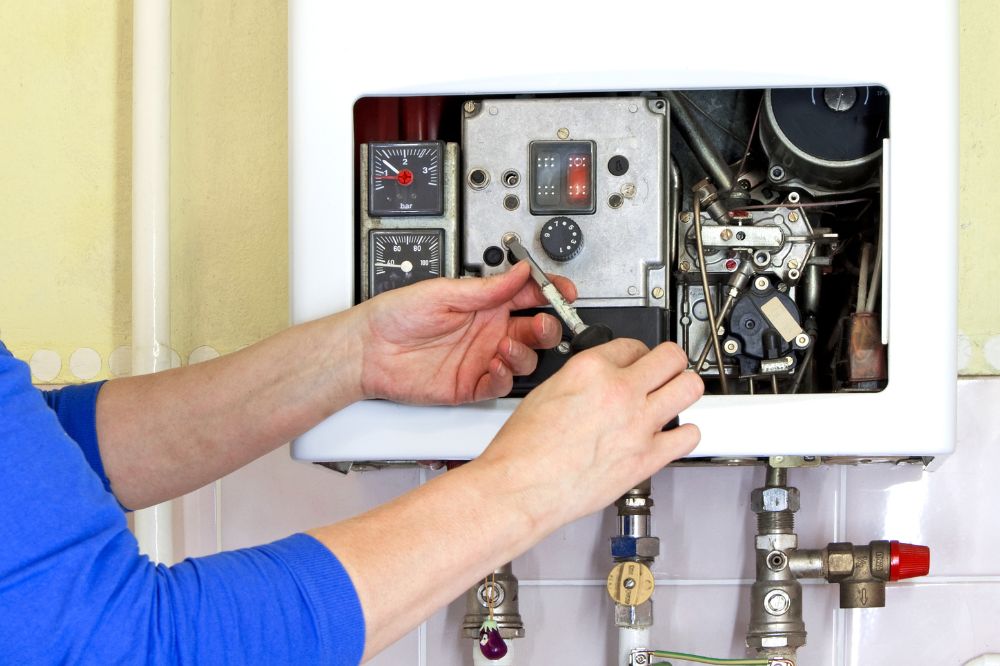If you suspect a leak in your home’s plumbing, it’s crucial to act quickly. Even a small leak can lead to water damage, mold growth, and higher utility bills. The good news is, there are simple ways to spot leaks before they turn into costly repairs.
At Minuteman Plumbing, Heating & Cooling, we help homeowners in Cambridge keep their plumbing systems in top shape. Below, we’ll share expert tips for detecting leaks on your own—and explain when it’s time to call in a professional.
Section 1: Why Leak Detection Matters
Water leaks are often silent and hidden, but their damage can be serious. Here’s why detecting them early is crucial:
- Prevent structural damage and mold growth
- Lower water bills
- Avoid emergency plumbing failures
Spotting leaks early can save you money and help keep your home safe and comfortable.
Step 1: Check Your Water Meter
Your water meter is one of the best tools for detecting hidden leaks:
- Turn off all water: Shut off faucets, appliances, and outdoor hoses. Make sure toilets aren’t refilling and washing machines are off.
- Locate the meter: Typically found near the street or in a covered box in your yard.
- Look for a leak indicator: Many meters have a small triangle dial or a silver wheel that moves when water is flowing.
- Do a two-hour test: Record the meter reading, wait 1–2 hours without using any water, and check again. A change in the reading means water is leaking somewhere.
Step 2: Determine if the Leak Is Inside or Outside
Narrowing down the source helps you decide what to do next:
- Turn off the main shutoff valve: This is often located near an outdoor faucet or basement entry.
- Recheck the meter:
- If the meter stops moving, the leak is inside your home.
- If the meter keeps moving, the leak is outside, usually in the underground supply line.
- If the meter stops moving, the leak is inside your home.
Step 3: Inspect Visible Pipes and Fixtures
Leaks can often be spotted by looking or listening. Check these areas:
- Under sinks, toilets, and cabinets
- Walls and ceilings for damp spots or stains
- Crawl spaces or basements for dripping
- Appliance connections (washing machine, dishwasher, water heater)
Step 4: Monitor Your Water Bill
A sudden or steady increase in your bill—without any increase in water usage—can be a sign of a hidden leak. Compare your current bill with past ones to spot any trends.
Step 5: Watch for Mold, Mildew, or Rot
Leaks behind walls or floors often reveal themselves through:
- Musty odors
- Mold or mildew spots
- Warped flooring or rotting wood
- Cold or damp areas on walls
If you notice these signs, it’s time to call a professional plumber for full plumbing services Cambridge.
How Professionals Detect Hidden Leaks
When the source of a leak isn’t obvious, Minuteman’s technicians use advanced tools such as:
- Moisture meters to detect damp areas behind walls
- Acoustic listening devices to amplify sounds of water escaping
- Video inspection cameras to look directly inside your pipes
This technology allows us to pinpoint leaks without unnecessary demolition.
Common Leak Sources
Certain areas are more prone to leaks:
- Toilets: Around the base or between the tank and bowl
- Faucets: Worn washers, seals, or supply lines
- Water heaters: At the pressure relief or drain valve
- Outdoor fixtures: Hose bibs and irrigation lines, especially after freezing weather
Preventing Future Leaks
Once a leak is repaired, you can reduce the risk of future leaks by:
- Scheduling annual plumbing inspections
- Replacing worn pipes, hoses, and valves
- Choosing high-quality fixtures and materials
- Insulating pipes exposed to cold temperatures
Why Choose Minuteman Plumbing, Heating & Cooling?
Cambridge homeowners trust Minuteman because we offer:
- Complete leak detection and repair services
- Fully licensed, insured, and background-checked technicians
- 24/7 emergency service when you need it most
Conclusion:
Don’t let a leak go unnoticed.
A plumbing leak can stay hidden for weeks, months, or even years—causing silent but costly damage. Whether you suspect a problem or just want peace of mind, Minuteman Plumbing, Heating & Cooling can help.
Call today for fast, reliable leak detection and plumbing services in Cambridge.
Frequently Asked Questions About Plumbing Leaks in Cambridge, MA
Here are answers to some of the most common questions we hear from Cambridge homeowners:
How do I know if I have a hidden water leak?
In Cambridge homes—many of which are historic or have older plumbing systems—leaks often show up as unexplained spikes in your water bill, damp spots on plaster or drywall, or musty odors in basements and crawl spaces. If you hear water running when everything is shut off, that’s another red flag.
Is a small leak an emergency?
Yes. Even a slow drip can cause big problems in Cambridge homes, where wood framing and older construction materials are especially vulnerable to rot and mold. Small leaks also become much more dangerous in winter, when freezing pipes can expand the damage quickly.
Can I fix a leak myself?
You might be able to handle a dripping faucet or replace a worn washer. But hidden leaks in older Cambridge homes often occur behind walls, under floors, or in underground supply lines. These usually require professional tools—like thermal cameras or acoustic sensors—to find and fix without tearing into walls unnecessarily.
How often should I check my home for leaks?
Given Cambridge’s cold winters and aging housing stock, we recommend a quick self-check every few months and a professional inspection once a year. This is especially important before the winter freeze, when pipes are at the highest risk of bursting.




%20(1).jpg)

